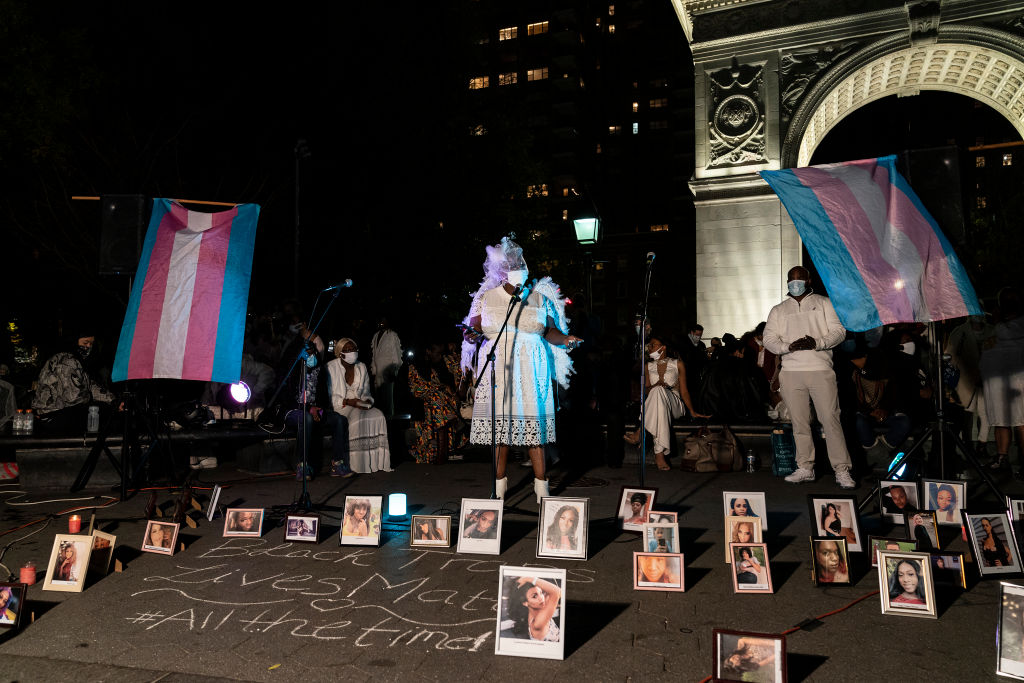Celebrating Those Loved And Lost On Transgender Remembrance Day
Source: Pacific Press / Getty
Commemorated each year on Nov. 20, Transgender Day of Remembrance is an opportunity to reflect and celebrate the life and humanity of those loved and lost. The first recorded day of remembrance was in 1999 in honor of Rita Hester, a Black transwoman murdered in November 1998.
Her brutal murder remains unsolved, likely by an acquaintance. An active member of her community, Hester’s murder set off a movement that has not missed a step. While awareness of violence against transgender people has become more mainstream, trans and nonbinary organizers continue to lead the fight.
According to the Human Rights Campaign, 2021 has been a deadly year for transgender and gender non-conforming people, with 47 reported killings.
“These victims, like all of us, are loving partners, parents, family members, friends and community members,” the report read. “They worked, went to school and attended houses of worship. They were real people — people who did not deserve to have their lives taken from them.”
The Human Rights Campaign attributed violence against transgender and gender non-conforming people to racism and sexism, anti-trans stigma and dehumanization, denial of opportunity and increased risk factors.
As outraged as people are by police brutality or white supremacist violence, they should be disturbed by transphobic attacks. All three injustices deny people of their humanity and the right to live.
Part of the fight is providing community safety and opportunities to thrive. The Atlanta-based Solutions Not Punishment Collaborative (SNaPCo) is a Black trans and queer-led organization committed to creating alternatives to punitive systems and providing a pathway to liberation.
In an interview with NBC News, Toni Michelle, executive director of SNaPCo, shared the organization has provided support to community members with a small fraction of the recent budget increase to the Atlanta Police Department. The organization operates on far less than the $15 million increase.
“Just imagine what we could do for our communities — Black trans and queer folks, sex workers, formerly incarcerated people — with at least 3 percent of that funding,” she said. “I definitely just want to encourage people to continue to push and to join our side around what it means to reallocate funding from these large institutions that have so many resources. Our communities are in need of them.” (Read the full NBC report here).
But as government entities and organizations recognize the day, it’s important to support and stand in solidarity with trans people when they are living.
This month, the Marsha P. Johnson Institute put out a call to action to protect Black Transgender People by encouraging supporters to call on members of Congress to pass the Equality Act.
“It’s really that simple,” the organization tweeted. “Now is the time for our country to protect equal rights for all, in a way that is just and equitable. Too often, ‘equal rights for all’ doesn’t really mean ‘all.’ We demand an Equality Act that centers BLACK transgender people.”
It’s really that simple. Now is the time for our country to protect equal rights for all, in a way that is just and equitable. Too often “equal rights for all” doesn’t really mean “all.” We demand an Equality Act that centers BLACK transgender people.
https://t.co/SEWPdNIPdW pic.twitter.com/AlWHn0aMUe
— Marsha P. Johnson Institute (@MPJInstitute) November 2, 2021
See Also:

